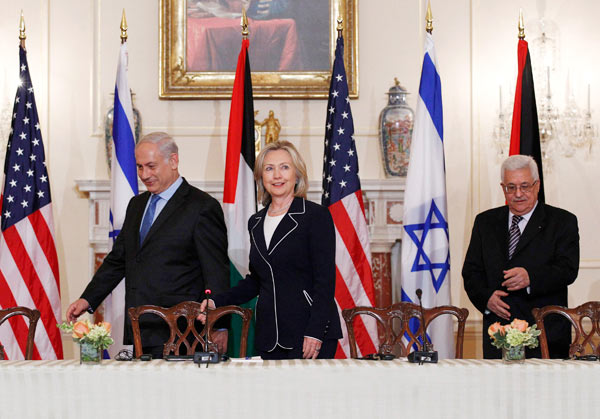-
News >World
Mideast peace talks launched
2010-09-03 07:01WASHINGTON - Israeli and Palestinian leaders began direct peace negotiations on Thursday, sitting down for US-brokered talks even as hard-liners on both sides vowed never to accept a deal.
One day after US President Barack Obama made a personal appeal for peace, Secretary of State Hillary Clinton welcomed Israeli Prime Minister Benjamin Netanyahu and Palestinian President Mahmoud Abbas to the State Department to begin talks aimed at establishing an independent Palestinian state.

US Secretary of State Hillary Clinton hosts Israel's Prime Minister Benjamin Netanyahu (left) and President of the Palestinian Authority Mahmoud Abbas in direct talks aimed at Middle East peace in Washington on Thursday. [Jim Young / Reuters]"This will not be easy," Netanyahu said as talks began. "A true peace, a lasting peace, (would) be achieved only with mutual and painful concessions from both sides."
"The people of Israel, and I as their prime minister, are prepared to walk this road and to go a long way - a long way in a short time - to achieve a genuine peace that will bring our people security, prosperity and good neighbors," Netanyahu said.
Abbas called on Israel to end settlement activity and stop the blockade of the Gaza Strip.He said the negotiators face many hurdles, but he also said the goals are clear and the path to an enduring peace is known to both sides. He said that means it should be possible to achieve a final agreement within one year, as prescribed by the US.
The direct peace talks, which Obama hopes can reach a deal within a year, come after a 20-month hiatus. Negotiators face deep divisions among both Israelis and Palestinians over the prospects for peace.
"By being here today, you each have taken an important step toward freeing your peoples from the shackles of a history we cannot change and moving toward a future of peace and dignity that only you can create," Clinton said.
Obama, hosting the Washington talks ahead of the pivotal November US congressional elections, used separate meetings with Netanyahu and Abbas on Wednesday to urge them not to let the chance for peace slip away.
The issue of settlements looms large over the peace talks. Abbas has warned he will walk out unless Israel extends its self-imposed moratorium before it expires on Sept 26.
But Netanyahu, who heads a coalition dominated by pro-settler parties, has resisted any formal extension of the partial construction freeze, meaning the fledgling negotiations will face a major challenge within weeks.
Four Israeli settlers were killed by Hamas in a shooting attack in the West Bank on Tuesday.
Another two people were wounded in a similar attack by suspected Palestinian gunmen on Wednesday despite a crackdown by Palestinian police.
A Hamas spokesman on Thursday dismissed the Washington talks, and said Abbas, who leads the Fatah faction that holds sway in the West Bank, does not have the right to speak for the Palestinians.
Jewish settlers, who have threatened to depose Netanyahu if he does not allow them to resume building, said they planned to launch new construction even before the government's freeze ends on Sept 26.
They also rejected Palestinian hopes to set up their own state on the West Bank.
Reuters
